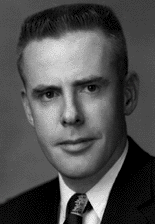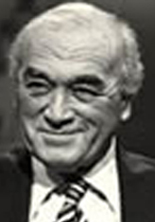| Home | Blog | Ask This | Showcase | Commentary | Comments | About Us | Contributors | Contact Us |

A paean to the late James Goddard, and to Martin Agronsky as wellSHOWCASE | January 09, 2010Morton Mintz recalls getting candid answers from Goddard, then FDA Commissioner, on Agronsky’s ‘Face the Nation’ in the 1960s, a time when – believe it or not – some Sunday morning talk shows cared about, reported, and made news. By Morton Mintz The stellar achievements of Dr. James L. Goddard as commissioner of the Food and Drug Administration from 1966 to 1968 were rightly celebrated in newspape
 r obituaries, particularly in the New York Times and the Washington Post. r obituaries, particularly in the New York Times and the Washington Post.Dr. Goddard, shown at right, "helped revolutionize the federal government's methods of evaluating drugs" and "strove to put the F.D.A. on a sounder scientific footing to better serve the consumer," Douglas Martin wrote in the Times. He "cracked down on exaggerated drug advertising and delayed approval of new drug applications until manufacturers had backed them up with more laboratory and clinical testing. And he campaigned to take ineffective drugs off the market."
"As the first medical doctor to serve as commissioner of the agency in 45 years, he assumed office at a time when critics considered the FDA 'a bumbling bureaucracy' and 'a prisoner of an industry more interested in its profits than its products,' the Los Angeles Times reported in 1966," Valerie J. Nelson wrote in the Washington Post. "Almost immediately, he told the powerful pharmaceutical industry that drug research was inadequate and would have to be improved. Drug recalls grew by nearly 75 percent during his first year as commissioner, the agency said. Dr. Goddard undertook a sweeping investigation of the effectiveness of about 4,000 medicines, many of which had been widely available for years."
I would add a personal note of praise for Goddard (and for President Lyndon B. Johnson for having appointed him).
In January 1967, Dr. Goddard was the guest and I a questioner on CBS's Face the Nation, then run by Martin Agronsky (shown at right below). That was seven years after the FDA had approved the first birth-control pill, Enovid, on the basis of absurdly thin evidence of safety: testing in a mere 132 women for a maximum of 38 consecutive menstrual cycles. I asked
 Goddard whether this had been an adequate scientific foundation for releasing Enovid for long-term use by millions of women. He replied that it had been his impression that "large-scale studies" had preceded marketing. Then a huge TV audience across America heard him say: "Whether today, if the same problem came up de novo, I would make the same judgment that was made then, I can't say." Goddard whether this had been an adequate scientific foundation for releasing Enovid for long-term use by millions of women. He replied that it had been his impression that "large-scale studies" had preceded marketing. Then a huge TV audience across America heard him say: "Whether today, if the same problem came up de novo, I would make the same judgment that was made then, I can't say."From that time forward, he took a very forthright stand on Enovid's safety. In April 1967, for example, he said in a speech to Planned Parenthood physicians – a speech widely ignored by the press – that adverse reactions to Enovid were being "grossly under-reported" and that the lack of adequate data was a "grave issue."
Here is some context for my televised exchange with Goddard.
Today's Sunday morning talk shows are far more routinely awash in politicians than was the case back then. Take Jan. 3 as an example. For good reason, John O. Brennan, assistant to the president for homeland security and counterterrorism, was a guest on four of the shows. But look at the other guests: Fox News Sunday had Senator Christopher S. Bond (R-Mo.); CNN's State of the Union had (cheap-shot artist) Senator Jim DeMint (R-S.C.) and Senator Claire McCaskill (D-Mo.); ABC's This Week had Senators Joseph I. Lieberman (Insurance-Conn.) and Susan Collins (R-Maine), and Reps. Jane Harman (D-Calif.) and Peter Hoekstra (R-Mich.).
So, in retrospect, the Goddard era in many regards looks like a journalistic Golden Age. Some hosts, particularly Agronsky, frequently exposed corporate executives and federal regulators to tough questioning by journalists who had done critical reporting about their companies and industries. One more example will make the point.
I had been writing about the tobacco industry in the Washington Post for six years when, in 1971, Agronsky invited me to question Philip Morris board chairman Joseph Cullman III on Face the Nation. The timing was grand. A recent massive United Kingdom study had revealed that babies of mothers who smoked had a greater incidence of low birth weight than did the babies of non-smoking mothers. The study further established that babies of mothers who smoked had an increased risk of stillbirth and death within 28 days of birth.
I asked Cullman about the study, and he said he was aware of it and its results. "Some women would prefer having smaller babies," he said. "What about the higher rate of death?" I asked. A nation-wide television audience was able to hear and watch his plainly unpersuasive response: "I'm not familiar with that."
Fair question: Today, if invited, how many top corporate executives would knowingly appear on a TV show where they would expose themselves to tough questioning by knowledgeable reporters?
My guess: extremely few.
|



